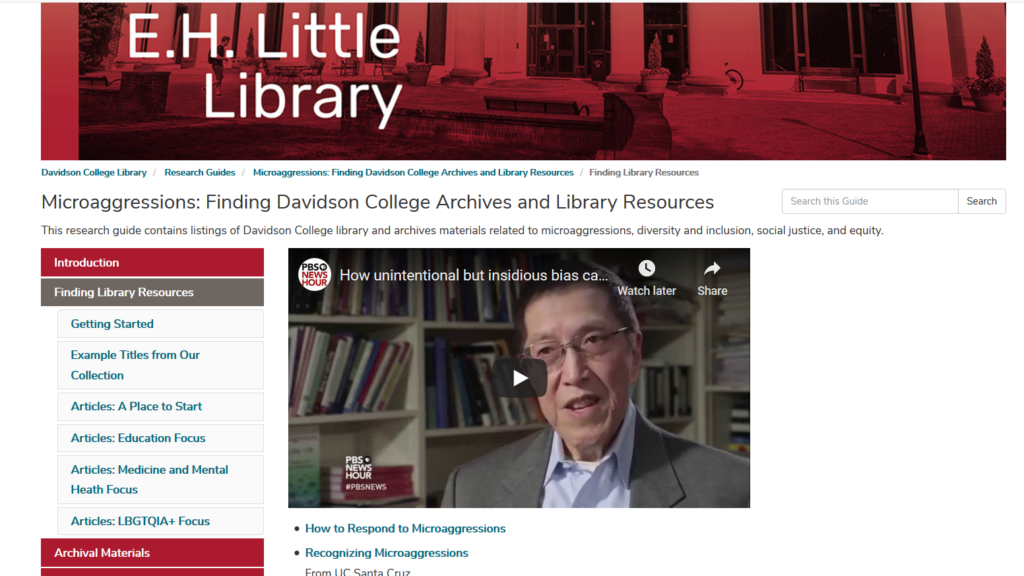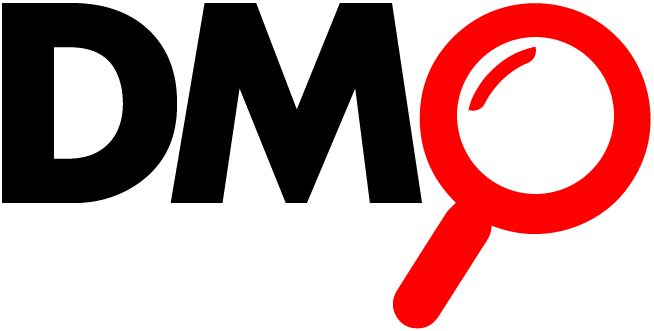In 2018-2019, the DMP student collaborators held a discussion with the library staff at Davidson College at their request as part of an ACS (Associated Colleges of the South) grant on inclusive pedagogy that involves resource availability and facilitating student success. The DMP and student-centered perspectives provided insights for the library staff as one avenue of their goals. Soon after, the DMP initiated the development of a research guide on microaggressions after consulting with the information literacy librarians and digital archivists. Here is the link to our research guide (also on our Resources page).

ACS Grant Inclusive Pedagogy for Library Instruction 2018-2019
1. Describe the project.
As our institutions seek to cultivate more diverse and inclusive environments, library instruction provides an opportunity for librarians to also consider our own biases and utilize inclusive pedagogies to improve our learning environments for all. While there are programs to introduce inclusive pedagogies to traditional classrooms on our campuses, library instruction presents unique challenges. Many times, we are conducting what we call “one-shots” that hinder our ability to apply certain pedagogical techniques. In particular, time constraints and predetermined content requirements make it difficult to establish and sustain relationships with our students in the same way that instructors of record do.
3. Explain the project’s relevance to one or more of the grant themes.
The project ties together both the Innovative Instruction and Diversity and Inclusion themes. As our campuses become more diverse, the learner-centered and equity-focus of inclusive pedagogy will be critical to student—and institutional—success. The libraries provide a unique opportunity to influence institutional culture because we engage with students and faculty across departments and divisions. Modeling inclusive practices in library instruction reinforces the inclusive environments faculty are striving to create throughout the semester and that our institutions seek through strategic goals and inclusive initiatives across campus.
Project Goals:
* To learn more about what inclusive pedagogy is and how it is applied generally to higher education
* To learn more about related pedagogies, such as critical theory, LGBTQ+ studies, and anti-racist pedagogy, and how they are currently manifested in library instruction
* To apply ideas of inclusive pedagogy and related pedagogies to library-specific instruction, particularly one-shot classes and workshops
* Identify potential inclusive best practices for library instruction and pilot them in real-classroom situations
* Identify appropriate measures for determining the impact of inclusive pedagogy practices on students
* Identify specific situations which increase inclusive instruction success
* Create a support network for innovative inclusive instruction across ACS libraries
Student Interview Questions
October 19, 2018
Microaggressions and Inclusion
Before we begin, do you have any questions for us?
1. Would you mind to share the background on the Davidson Microaggressions Project?
2. What are some of the more common microaggressions that you have heard of? (Not to perpetuate them, but so that we have more awareness around what they are.)
3. What are some non-verbal microaggressions that you have heard of or experienced?
4. Have you noticed microaggressions towards other categories that are part of inclusive pedagogy e.g. First Generation, economically limited?
5. Have you noticed more microaggressions towards racial and ethnic minority students?
6. What are some of the short-term or long-term impacts on people who are the target of these microaggressions?
7. From your perspective, should teachers/librarians respond in some way to classroom microaggressions?
8. If yes, from your point of view, how can an instructor respond to a microaggression that happens during class e.g. in front of the entire class, privately, some other technique?
9. How can an instructor make a safe space where students feel comfortable responding to microaggressions?
10. How can librarians in library instruction sessions make sure we are welcoming all students?
11. Are there other reasons for racial and ethnic minority students to feel unwelcome at college?
12. Do you have any suggestions regarding how to address these in the classroom?
13. How might students’ identities, ideologies, and backgrounds influence their level of engagement in the classroom?
14. Do you have any suggestions regarding how to improve students’ engagement in the classroom?
15. Would it help to establish ground rules, plus share and discuss those ground rules prior to discussing controversial issues in the classroom?
16. Would it help if instructors included diversity issues on the syllabus or other written handouts and then discussed the inclusive teaching philosophy and methods described in the documentation?
17. How can librarians in library instruction sessions make sure we are welcoming all students?
18. When you envision a library space as welcoming for a diverse student body, what does it look and feel like? Have you ever been in a library space that you viewed as inviting and welcoming of diversity?
19. How would you prefer to provide feedback to a professor about the issues we discussed today e.g. anonymous survey?
20. Is there anything else that you would like to add?
